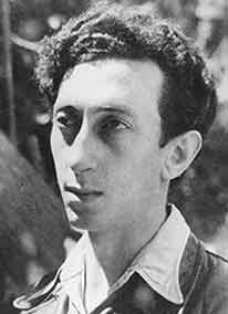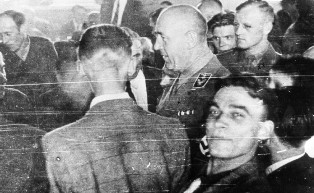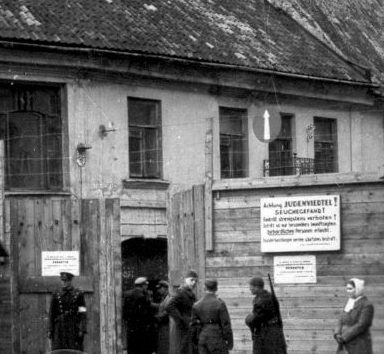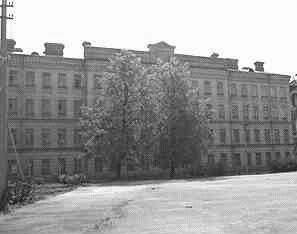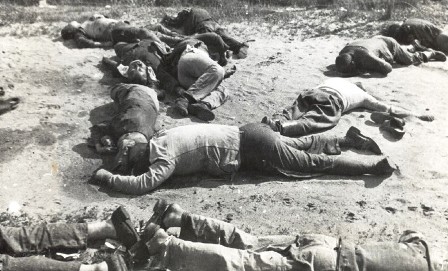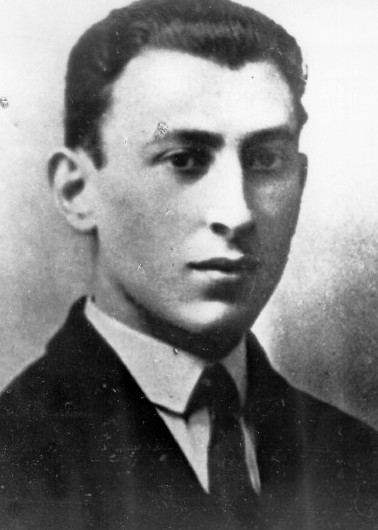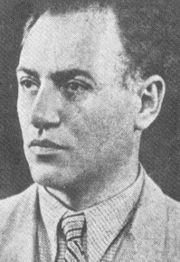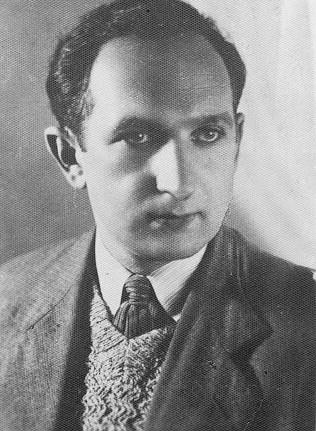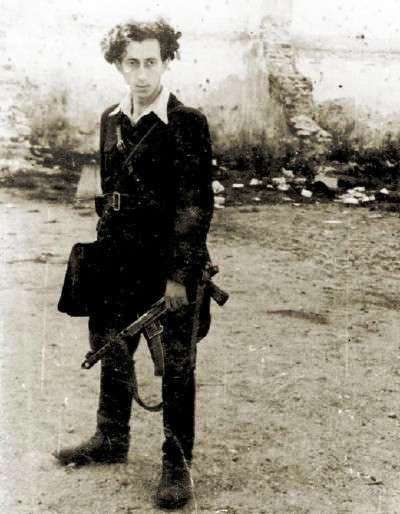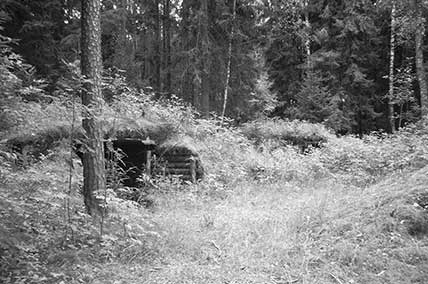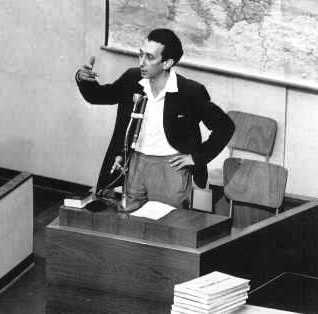Gilbert, Martin. The Holocaust: A History of the Jews of Europe During the Second World War. New York: Holt, Rinehart and Winston, 1985.
Holocaust Education & Archive Research Team |
Revolt & Resistance
Acts of Resistance
Jewish Resistance
Groups Jewish Resistors Allied Reports Anti-Nazi Resistance Nazi collaborators
| ||||||||
Abba Kovner "Partisan & Poet"
Abba Kovner was born in 1918 in Sebastopol, Crimea, on the shores of the Black Sea. His early life was the typical model of Jewish youth of the time. He was raised in Vilna, the preeminent center of Jewish learning since the seventeenth century and was exposed to every variety of Jewish thought and the teachings of traditional and modem persuasions, from orthodoxy to socialism. Abba attended the University of Vilna as an art student, learning to sculpt. and later developed a passion for poetry.
Like many other boys his age Abba became interested in the Zionist movement and joined a local youth group, the "Ha-Shomer ha-Tsa'r". However Abba Kovners' destiny would be anything from typical, and the Nazi war machine would ensure that was to be the case. Less than a month after the Germans occupied Vilna, they conducted their first Aktion. Einsatzkommando 9 rounded up 5,000 Jewish men of Vilna and took them to Ponary, an abandoned Soviet oil storage facility with large pits designed to house fuel.
The Germans found these pre-dug "pits" a convenient place to dispose of the bodies of not only these Jews but also the thousands of others they would bring there under the pretense of being sent to labor camps, when they were really sent to Ponary to be murdered.
The SS established two ghettos in Vilna, referred to as Ghetto No. 1 and Ghetto No. 2. The following day they swept through the city and forced the remaining Jews of Vilna into the newly created ghettos.
About 30,000 Jews were forced into Ghetto No. 1 and between 9,000 and 11,000 Jews into Ghetto No. 2. However, Kovner and sixteen other members of the Ha-Shomer ha-Tsa'ir chose not to be locked away in the ghetto and fled the city. Hiding out in a convent of Dominican nuns a few miles outside of Vilna, they watched as the Nazis conducted one series of actions, after another. Though they had experienced unabated terror and destruction since the Germans arrived, the Jews of Vilna were still not ready to believe the truth about the mass shooting of Jews. On September 17 1941, SS squads, assisted by Lithuanian auxiliary units, shot more than 1,200 Jews from the Vilna ghetto, including almost 700 women and 250 children in the pits at Ponary. Those who remained in the ghettos learned nothing of the fate of their missing loved ones and when a survivor of Ponary actually, came back to the ghetto and told of her experiences, few wanted to believe her story. But Abba Kovner had no illusions about the German intentions for the Jews of Vilna.
He had seen first hand the treatment the Jews had received during one of the early actions; watching through a window, he saw a woman dragged by the hair by two soldiers, he later told his comrades what he saw:
The woman crawled on the earth, took hold of his boot and pleaded for mercy. But the soldier took the boy and hit him with his head against the wall, once, twice, smashed him against the wall!"
By December of 1941 it became clear too many Jews in the Ghetto that the Germans meant to kill them all, and some formed activist groups while others made a call to resist. Abba Kovner was one of these who wished to fight but there seemed to be no clear consensus amongst the activists on how best to do so.
In an impassioned speech delivered at one of the Ghetto soup kitchens he shouted to those around him:
Ponary is not a concentration camp. They have all been shot there. Hitler plans to destroy all the Jews of Europe, and the Jews of Lithuania have been chosen as the first in line.
Shortly thereafter the United Partisan Organization-Fareinikte Partisaner Organizatzie - F.P.O.- was formed on January 21, 1942 in the Vilna Ghetto. It took for its motto "We will not go like sheep to the slaughter," from the speech given by Abba Kovner. The goals of the FPO were to establish a means for the self-defense of the ghetto population, to sabotage German industrial and military activities and to join the partisan and Red Army’s fight against the Nazis.
Initial studies of how to defend the compact space of a few city blocks, cut off from outside contacts and sources of arms, made some believe that the only real defense would be classical hit-and-run partisan warfare from bases outside the ghetto. However not all Ghetto Jews were in favor of the resistance movement. The Vilna Judenrat led by Jacob Gens felt that the only way for the Jews of Vilna to survive total annihilation was to prove that the Ghetto was economically useful to the Germans and their war effort.
Fearful that the activists would bring severe reprisals on the remaining Jews, Gens, aided by his Ghetto Police, began a propaganda campaign against the resistance. He succeeding in convincing the leaders of the "Work Brigades" to support his efforts, and was able to turn public opinion against the FPO and its leaders.
It was at this meeting that Gens had FPO leader Wittenberg arrested and taken out of the meeting, other F.P.O. members were alerted, and in anger attacked the Jewish police, eventually freeing Wittenberg, who immediately went into hiding inside the ghetto.
The next morning, in response to the failure of Gens to produce FPO leader to the Gestapo, it was announced that if Wittenberg were not apprehended, the Germans would liquidate the entire ghetto of all 20,000 of its remaining Jews. Gens in a panic went to the people once more, claiming that the resistance members were provoking the Nazis, he asked them:
"Whether it was worth sacrificing tens of thousands of lives for the sake of one man?"
The Ghetto inhabitants in large numbers began to demand the FPO give Wittenberg up, some even attacked FPO members with stones. The FPO was faced with literally a life-or-death crisis:
How could they engage in a fight against the ghetto population they had taken an oath to defend?
Ultimately Wittenberg himself made the decision to submit to the Nazi demands and turn himself in. However before submitting himself to torture and death at the hands of the Gestapo, as his final act as leader of the FPO, he appointed Abba Kovner his successor. During the summer and fall of 1943, Kovner and his resistance fighters carry out acts of sabotage against German military trains and equipment transports, and even set up an illegal printing press outside of the ghetto.
One of their key goals was to establish ties to the Soviet resistance in the city and the forests. Kovner also sent emissaries to the Warsaw and Bialystok ghettos to warn the inhabitants about the mass killings of Jews in the occupied Soviet Union and to incite resistance.
The Jews of Vilna refused to believe this, as Jacob Gens had lead them to believe they were simply being sent to labor camps in Estonia. Fighting broke out between the FPO and the Germans, who brought in light artillery, and explosives, to flush out the ghetto fighters. But as soon as it grew dark, the Germans pulled out of the ghetto and left it to the Jewish Police to continue the hunt until daylight. After the initial skirmish with the Germans, Gens tried to prevent further destruction by offering to provide additional Jews for forced labor in Estonia, if only the Germans would leave the ghetto. The Germans agreed, and Jacob Gens had been given a quota of Jews to be deported.
Hoping to meet the German demands with those members of the FPO he could capture, the German authorities refused to wait, and rounded up every Jew they could get their hands on, eventually deporting all but 12,000 Jews from Vilna. Shortly thereafter, on On September 14, Jacob Gens was ordered to a meeting with the German authorities never to return. He was interrogated by the Gestapo who claimed he was aiding the resistance, and ordered him shot. Ten days later the ghetto was completely liquidated.
Once more the FPO urged the remaining Jews to resist the deportation but the last of the Jews of the Vilna ghetto, chose not to heed his call to arms.
The division played a key role in destroying power installations, water infrastructures and supply depots. They blew up German transport trains and even rescued groups of prisoners from the Kalais labor camp. After the war, Kovner helped organize the Beriha movement, in which hundreds of thousands of survivors made their way west in order to reach Palestine. Kovner and his wife, Vitka Kempner, who was also his partner in the underground movement, settled in Palestine, where he joined the Givati Brigade in order to defend the newly formed state of Israel.
In 1961 Kovner testified at the trial of Adolf Eichmann and later dedicated his life to poetry, he also authored several books, for which he won the 1970 Israel Prize in Literature.
Sources:
www1.yadvashem.org/odot_pdf/Microsoft%20Word%20-%206451.pdf Spiritual Resistance in the Vilna Ghetto. Kostanian-Danzig, Rachel (Vilnius: The Vilna Gaon Jewish State Museum, 2002). Kovner, Abba. "The Mission of the Survivors." The Catastrophe of European Jewry. Ed. Yisrael Gutman. New York: Ktav Publishing Inc., 1977
Copyright Carmelo Lisciotto H.E.A.R.T 2008
|
